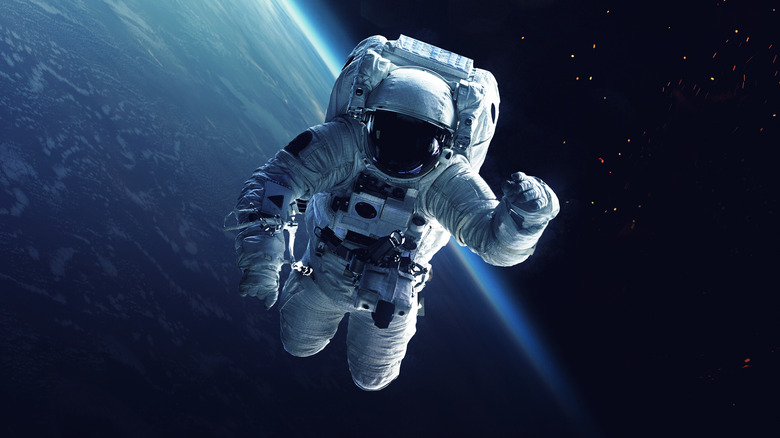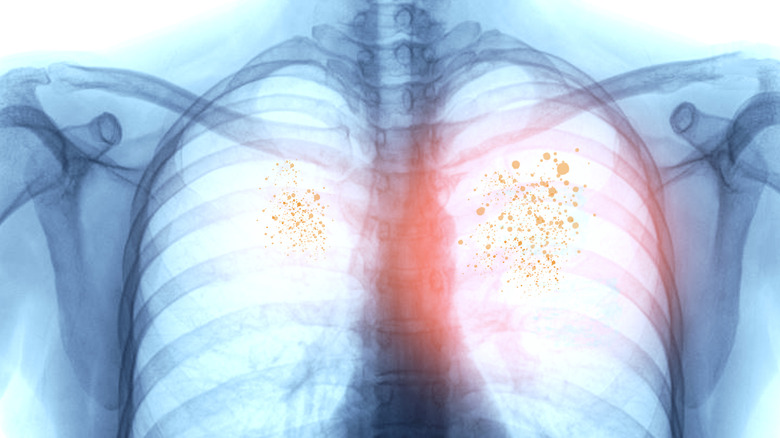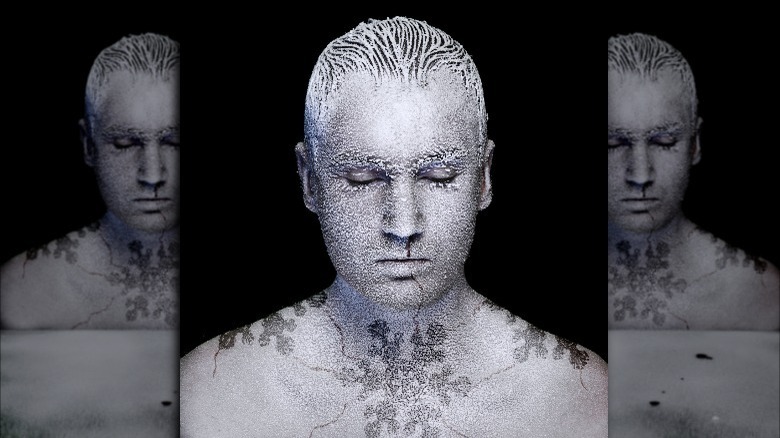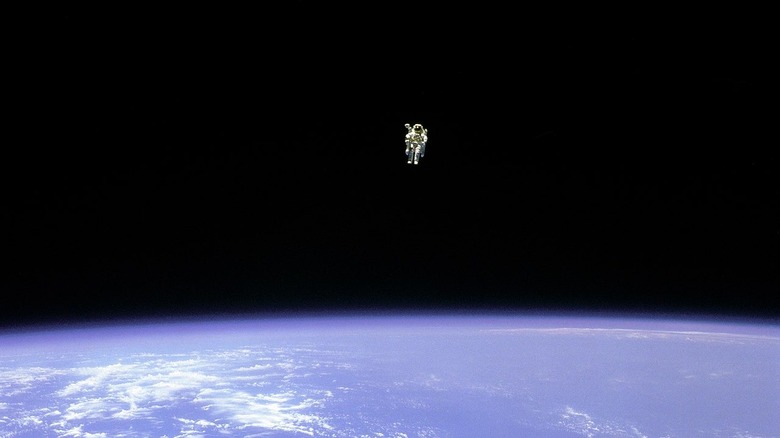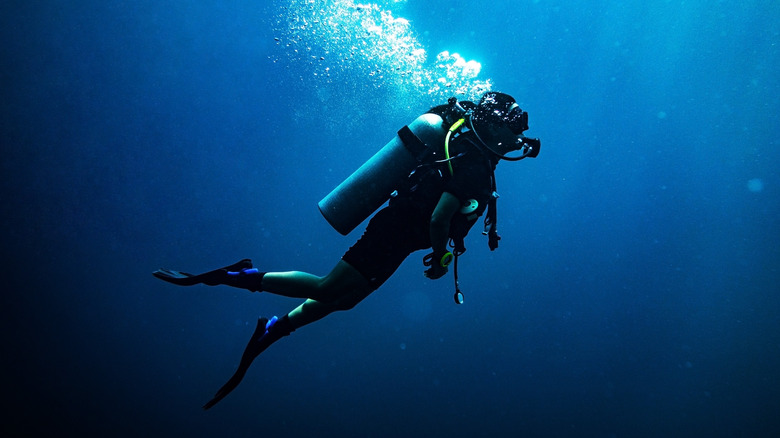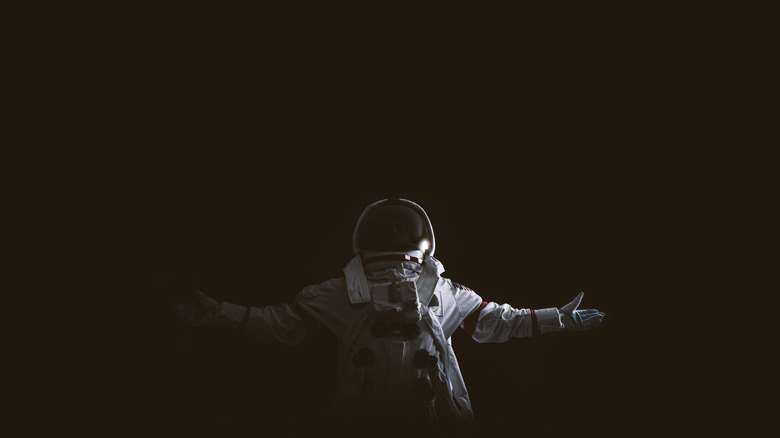Here's What Would Happen If You Fell Into Space
Considering that space is literally all around us, we spend a shockingly small amount of time thinking about it. After all, the only things between us and hurtling off into the inky vacuum are mysterious forces like gravity and friction, which might as well be magic as far as the ordinary person is concerned. When you consider it, space is terrifying.
Which is maybe why we don't think about what might happen if we found ourselves there. We also don't usually spend much time wondering what might happen if we were swallowed whole by a dragon, or dropped into an erupting volcano. But it's becoming increasingly likely that we could someday find ourselves in space. Billionaires are actively working to make space tourism a thing, after all, and the idea that working remotely might mean working from a space station or the Moon isn't totally crazy. Sure, still 99% crazy, but not totally.
So it's time to think about the practical considerations. Will the spacesuits of the future be flattering? Can we get Kanye to design them? How do people go to the bathroom in space? And what does space smell like, anyway?
But there's one issue you need to think about above all the others. Here's what would happen if you fell into space.
In the first few seconds, not much
There's a scene in Stanley Kubrick's 1968 sci-fi classic "2001: A Space Odyssey" in which astronaut Dave Bowman, tricked into leaving his spaceship without his helmet, uses an explosion to shoot himself across space into an airlock. He survives being in space without a scratch and without missing a beat.
As it turns out, this is pretty accurate. Space.com explains that if you found yourself thrust out into space without a spacesuit, you wouldn't immediately explode, your blood wouldn't boil in your veins, and you wouldn't freeze solid in seconds. CNET reports that your circulatory system is robust enough to maintain your blood pressure in a vacuum, and that your skin is durable enough to hold all of your insides together.
According to HowStuffWorks, you would probably come through a few seconds in space pretty well. If you were rescued almost immediately and pulled into a pressurized atmosphere right away, you'd have nothing but a really exciting story to tell — there might be no lingering effects at all. Of course, being rescued "almost immediately" is key here — beyond a few seconds, things are going to go downhill, and fast.
You'd swell up like Violet Beauregarde
Your skin is pretty strong stuff that is also slightly stretchy, so you wouldn't explode in space. But you would swell up like a balloon, or like Violet Beauregarde in "Willy Wonka and the Chocolate Factory."
The human body is essentially a large sack of liquid — we're mostly water. CNET explains that in the absence of atmospheric pressure, the water in your tissues (as well as the dissolved nitrogen in your blood) would begin to vaporize after about 10 seconds, making your cells swell up. Your skin is strong enough to stop you from bursting, but it wouldn't be comfortable. As Science in the News points out, this is called ebullism, and if it's not dealt with (by no longer being in space, or, perhaps, having a friend jet over with a space suit that can fit over your horribly swollen body) it can lead to an embolism — a blockage in a blood vessel due to an air bubble in your blood, which is usually fatal.
Space.com assures us that if you got to a safe place quickly and your body was allowed to return to normal, you wouldn't suffer any long-term effects beyond some bruising. But if you were out there like a space blueberry for too long, there could be serious tissue damage and eventual death.
Your lungs might burst
When we jump into deep water, we instinctively take and hold a deep breath. In a pressurized atmosphere, our respiratory system can keep pulling oxygen from the air in our lungs for a short while, keeping us alive and alert. In fact, the Guinness Book of World Records tells us that the record for holding breath is actually an incredible 24 minutes and 37 seconds, which you might think would give you plenty of time to roam around in space, taking in the sights.
Except for one small problem: If you held your breath in space, your lungs would explode.
Space.com explains that our bodies aren't built to handle air pressure in a vacuum. Rather, they are designed to exist in an environment where the gases that make up our atmosphere are constantly pressing down on us from every direction. Holding your breath as you drop into space would have a similar result to divers who ascend from deep water too quickly: your lungs would rupture. Science in the News explains that the air in your lungs would expand suddenly (and violently) in the absence of exterior pressure, and that this would almost certainly kill you. So counter-intuitively, if you find yourself about to be expelled into space (by, say, angry space pirates) the best thing to do is exhale.
You'd probably freeze, but slowly
Something that wrinkles many brains is the fact that, as Science in the News explains, space is not cold. In fact space has no temperature at all. That's because space is a vacuum — it is literally nothing, meaning that there is nothing to conduct or transfer heat energy.
As such, if you fell into space, you wouldn't turn into a block of ice immediately, despite what some sci-fi movies might have you believe. But you would freeze out there eventually. Space.com explains that the human body is actually pretty efficient with its heat, but that we radiate heat on a constant basis — about 100 watts worth. That's not a lot of heat, and here on Earth we're insulated by the atmosphere around us and heated by our environment, so we barely notice the loss. In a vacuum, you wouldn't have those benefits, but it would take a long time for your body to lose all of its heat energy.
What does "eventually" mean? According to Business Insider, it could take as long as 26 hours for you to freeze solid out there, unless you happened to be near a star like the Sun, in which case you might burn up instead. But don't worry, you'd be dead long before either happens.
Parts of you would boil
Space.com reports that if you were floating in space without a suit, your blood wouldn't boil in your veins — that would be crazy! However, other parts of you not protected by your thick, surprisingly durable skin would boil.
How do we know this? Thanks to a guy named Jim LeBlanc. Space Safety Magazine explains that LeBlanc was a spacesuit technician who volunteered to test out spacesuits in a vacuum chamber in 1966. A pressure hose on his suit became disconnected, and LeBlanc found himself unprotected in a near-total vacuum. He passed out after a few seconds, but the last thing he remembered was the moisture on his tongue boiling. Incredibly, LeBlanc survived with just an earache.
The Arcanist says that there's another part of you that's quite moist and unprotected by skin — your eyes. If you fell into space, they'd boil right inside your head. In fact, according to Engines of Our Ingenuity, that eye-boiling action would happen almost immediately. So much for taking in the sights as you float in space.
You'd pass out pretty fast
Here on Earth, even if you don't hold your breath, you can remain conscious for a while without oxygen because your respiratory system will still pull the remaining oxygen from your blood as it cycles through your body. Eventually you'll pass out, but humans can operate without breathing for a little while. But, as Space.com explains, it's fundamentally different in space. Without the benefit of a pressurized space suit, you'd go maybe 15 seconds before passing out.
That's because our lungs weren't designed for a vacuum. Science in the News explains that without atmospheric pressure, our normal respiration actually diffuses oxygen out of the bloodstream. So the reserve of oxygen we rely on when we can't breath is depleted extremely rapidly, leading to hypoxia. Your brain needs a constant supply of oxygen to operate, so as hypoxia sets in it starts to shut down almost immediately, leading to unconsciousness. So if you do find yourself in space, think fast — you're already out of time.
You'd be disoriented and confused
As noted, if you were thrust out into space without a suit, you wouldn't have much time to figure out how to save yourself. If you held your breath, your lungs would burst. And you have maybe 15 seconds before you just pass out, after which it's pretty much game over.
But a lot can happen in 15 seconds. The problem is you're going to be extremely disoriented and confused, even if you expected to be pushed out into space for some reason and had plenty of time to prepare. BBC Future reports that even trained, experienced astronauts in space suits experience the "space stupids." They experience illusory sensations of movement, lose track of direction, and even have hallucinations.
According to Science in the News, most astronauts experience problems with balance and motor functions because the sensory organs of our bodies are attuned to a pressurized atmosphere with gravity. We're just not designed to interpret the experience of existing in a vacuum. Suddenly losing both pressure and gravity can leave you totally confused in regards to where things are in relation to yourself, such as an open airlock you might be able to reach. In summary, your 15 conscious seconds in space might not be your best moment, mentally speaking.
You'd get a pretty nasty sunburn
Our atmosphere doesn't get the credit it deserves. Sure, we all like breathing, and most of us credit our atmosphere for the privilege. But it also protects us from the lethal doses of radiation that are shooting through space all the time. Well, mostly — we still get sunburns, after all, which are low-key radiation burns.
Out in space, however, there's no atmosphere to protect us from that radiation. Even if you're not near a star like the Sun, you're going to get blasted by radiation —which means even a short stint in space will leave you with a serious case of sunburn. Science in Our World explains that you'd be bombarded by ultraviolet rays, gamma rays, and X-rays. And these wouldn't just burn your skin — they would likely damage your DNA as well. Science in the News reports more bad news: this exposure to radiation would happen within seconds, and the list of potential problems it could cause includes cataracts, cancer, and good old-fashioned Chernobyl-style radiation sickness.
Unless, of course, you're super close to that star, in which case you'll just burn up. Space.com offers some hope, saying that if your stint in space were relatively short, the sunburn could be survivable.
You'd suffer even if you were rescued
While you could survive a few seconds in space without a spacesuit, even if you were rescued very quickly, you'd still suffer. That's because even if you avoided the worst of the sunburn, exploding lungs, and swelling, CNET explains that you'd still be staring down a bad case of what's known as decompression sickness.
Healthline explains that the phenomenon is most often experienced by deep-sea divers who ascend too fast, astronauts returning from space (even with their suits), and hikers who descend from high places too quickly, and that it's sometimes called the bends. The sudden shift in atmospheric pressure causes bubbles to form in the blood and tissues, causing a range of awful symptoms including muscle and joint pain, headaches, stomach pain, chest pain, and even bad rashes. Severe cases can be fatal.
Since there's no more dramatic shift in atmospheric pressure than going from a total vacuum into a pressurized environment, that means the most painful and horrifying aspect of your suitless space experience might be after rescue.
You might get perforated
HowStuffWorks explains that there are small particles of dust or tiny pebbles called micrometeroids moving at incredibly high speeds out there in space. in fact, according to Quartz, that debris can reach speeds in excess of 17,500 mph. For comparison, Future Technology Reports notes that the top speed of a bullet is about 2,800 mph. And BBC News reports that there's a lot of stuff in orbit around Earth — about 500,000 pieces of space junk just speeding around and around, and some are pretty big, at least as large as an orange. That means that space is essentially filled with super-bullets, and if you encounter one or more while floating around out there in your birthday suit, forget about the boiling eyes and sunburn — you'll be dead from impact.
Quartz shows the frightening damage that tiny pieces of debris have inflicted on spacecraft out there in space — and those are big things made of metal and other tough materials. Imagine that stuff tearing through your soft body, and you have some idea just how painful your few seconds in space might be.
If you saw the 2013 film "Gravity," which stars George Clooney and Sandra Bullock, you saw what can happen when fast-moving debris hits something in space — like, say, a person.
Your body would eat itself
Fun fact: Up to six pounds of your body weight is due to the bacteria living inside you. Most of that bacteria is harmless and can even be important to your healthy body function.
According to National Geographic, our bodies are in constant battle with the bacteria inside us at all times. Our immune systems keep the bacteria out of our internal organs and in the spots where they can do us some good, like in our intestines, where bacteria assist with digestion. But when we die — which would be within about two minutes if we were floating unprotected in space — our immune system walks off the job (for obvious reasons), and it's party time for that bacteria.
That means that as your corpse floats serenely in space, bacteria would eat you from the inside out. But, as explained by Business Insider, the bacteria feast wouldn't last long — soon, all that bacteria would also be dead, and your very slowly decomposing corpse would be left floating in space.
You'd end up charcoal, a mummy, or a popsicle
Space.com reports that the longest you could probably survive in space without a spacesuit is about two minutes, and that you'd be unconscious for most of that. If no one came to rescue you and bring you back to a pressurized atmosphere, your organs would begin to shut down from lack of oxygen.
What happens next depends on your specific circumstances. Science ABC explains that the normal process of decomposition on Earth relies on oxygen, and there's no oxygen in space, so your body wouldn't decompose normally (your gut bacteria would do a little work, but wouldn't have time to complete the job before it died, too). So your body wouldn't rot.
According to CNET, what happens next depends on heat. If you're close to a heat source like the Sun — and since heat doesn't conduct well in the vacuum of space, you'd have to be pretty close — you could be mummified before floating off into eternity. If you're even closer to a heat source, you might burn up. And if you aren't close to a heat source at all, your corpse would freeze solid and become a corpsicle, moving serenely through space until some force acts on it. It's up for debate which of these fates is best, and of course by that point you wouldn't care any more.
